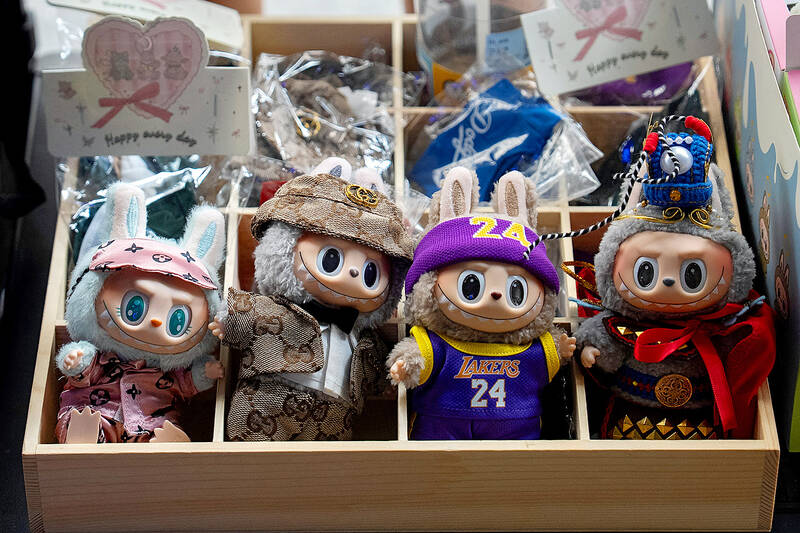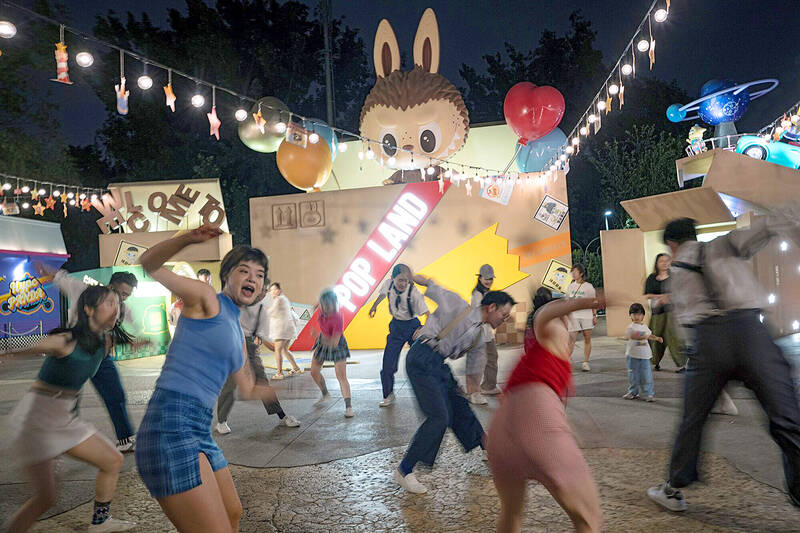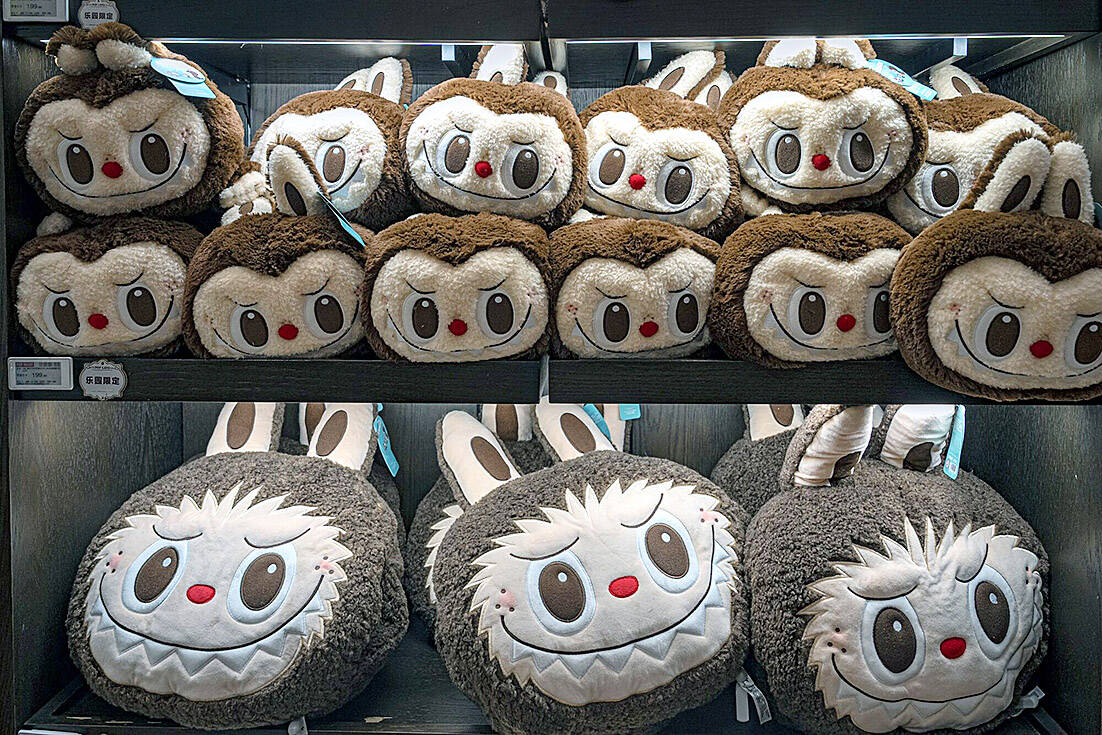Trolleys piled high with decapitated silicon monster heads, tattooed dealers lurking in alleyways, bin bags of contraband hidden behind shop counters: welcome to the world of Lafufus.
Fake Labubus (拉布布), also known as Lafufus, are flooding the hidden market. As demand for the collectable furry keyrings soars, entrepreneurs in the southern trading hub of Shenzhen are wasting no time sourcing imitation versions to sell to eager Labubu hunters. But the Chinese authorities, keen to protect a rare soft-power success story, are cracking down on the counterfeits.
“Labubus have become very sensitive,” says one unofficial vendor, in her small, unmarked, fake designer goods shop hidden on the 17th floor of a bland office building in Shenzhen’s Huaqiangbei district, an area known for cheap electronics. “We don’t dare to talk about it,” her colleague adds.

Photo: Reuters
Labubus, a furry bunny-eared elf sold by Chinese toy company Pop Mart, have gone viral this year. Touted by celebrities from Rihanna to Blackpink’s Lisa, the “ugly-cute” dolls have been so in demand that in the UK Pop Mart pulled the grinning monsters from all stores because of the risk of fights breaking out between customers. In the UK they retail for £17.50 (NT$693), while official versions in China sell for between 99 and 399 yuan (£10.30 – £41.40), with resale prices soaring much higher.
The hype has been embraced by the Chinese authorities, who have hailed Pop Mart as the latest Chinese brand to gain popularity overseas, following the likes of the viral video game Black Myth: Wukong and AI company DeepSeek.
‘CREATED IN CHINA’

Photo: Bloomberg
In June, People’s Daily, the Chinese Communist party’s official mouthpiece, praised Labubus as representing the shift from “Made in China” to “Created in China.”
“Labubu’s rise fuses China’s strong manufacturing base with creative innovation, tapping into the emotional needs of global consumers,” the article said.
Pop Mart’s elevation to the status of national hero also appears to have motivated the authorities, in a country trying to shed its reputation for being a land of knock-offs, to aggressively crack down on fakes. In April, customs authorities in the eastern city of Ningbo intercepted a batch of 200,000 goods suspected of infringing Labubu’s intellectual property, according to state media, with another sting last month catching over 2,000 fake goods.

Photo: Bloomberg
About 40km across town from the Huaqiangbei store, 59-year-old Li Yang* has never heard of a “Labubu.” But she spends hours each day sitting on a low plastic stool in her high-rise apartment building slicing apart hundreds of moulded silicon monster heads that will later become Lafufus.
Surrounded by piles of flesh-colored components, Li and her neighbor, Wang Bi*, another stay-at-home grandmother engaged in the painstaking work, spilled out into the hallway of their apartments.
“Since we’re staying at home, taking care of the kids, doing housework, we wanted to find some gig work,” Li says.

Photo: AP
Li didn’t know where the monster heads came from or were sent back to. The boss of a nearby factory reported by Chinese media to be producing Lafufus flatly denied any involvement, despite the presence of a pile of suspiciously Labubu-like heads piled high in the hallway.
FROM BUSINESS TO NATIONAL INTEREST
“China has never been so determined to fix IP [intellectual property] thefts, thanks to Labubu’s contribution not just as a global bestselling toy but as a soft power tool,” said Yaling Jiang, a Chinese consumer trends analyst. “Defending Labubu’s IP is no longer just about business interest, but [about] national interest.”
So the Lafufu market is going underground. Authorities in Shenzhen’s Huaqiangbei recently said they would be inspecting vendors for “counterfeit and shoddy” Labubus. But it doesn’t take long to find a dealer.
After a quick phone call made by one of the street-side vendors hawking fake designer bags and watches, a slight, tattooed man, his canvas tote bag dripping in cutesy furry keyrings, appeared out of nowhere.
He led me into a busy shopping mall and over to a counter selling hairdryers and sunglasses. With a few furtive glances, the smartly dressed shop assistant whipped out a black plastic bag from behind the counter, full of Lafufus, for sale for 168 yuan (£17.40) each.
Fakes likely come from a range of sources. But Li’s business model works like this: every few days, a courier wheels over a trolley piled with bags stuffed with hundreds of molded monster heads to Li’s apartment building. The heads are molded by a machine, but the act of splitting them into two, so that they can be stuffed and reassembled into a finished toy, is fiddly. It requires cutting along the curved edge of the toy’s head by hand, using a sharp knife.
So Li and her neighbors, all elderly women, are enlisted to slice the heads by hand, with the mystery factory paying them 0.04 yuan a piece. Every time the courier arrives, Li hauls down several large bags of split-open heads, and collects a new batch of elfin models, ready for dissection. One woman estimated she can cut through 800-1,000 heads a day, earning up to 40 yuan.
None of the workers interviewed had any idea what a Labubu was. Wang was shocked to hear that the finished products, fake or otherwise, sold for several hundred yuan. But one person in the home factory knew exactly what the toys were. As Li’s young granddaughter wandered into the hallway to find her grandmother inspecting a finished toy, she screamed: “Labubu!”
*Name has been changed.

Oct. 27 to Nov. 2 Over a breakfast of soymilk and fried dough costing less than NT$400, seven officials and engineers agreed on a NT$400 million plan — unaware that it would mark the beginning of Taiwan’s semiconductor empire. It was a cold February morning in 1974. Gathered at the unassuming shop were Economics minister Sun Yun-hsuan (孫運璿), director-general of Transportation and Communications Kao Yu-shu (高玉樹), Industrial Technology Research Institute (ITRI) president Wang Chao-chen (王兆振), Telecommunications Laboratories director Kang Pao-huang (康寶煌), Executive Yuan secretary-general Fei Hua (費驊), director-general of Telecommunications Fang Hsien-chi (方賢齊) and Radio Corporation of America (RCA) Laboratories director Pan

The classic warmth of a good old-fashioned izakaya beckons you in, all cozy nooks and dark wood finishes, as tables order a third round and waiters sling tapas-sized bites and assorted — sometimes unidentifiable — skewered meats. But there’s a romantic hush about this Ximending (西門町) hotspot, with cocktails savored, plating elegant and never rushed and daters and diners lit by candlelight and chandelier. Each chair is mismatched and the assorted tables appear to be the fanciest picks from a nearby flea market. A naked sewing mannequin stands in a dimly lit corner, adorned with antique mirrors and draped foliage
The consensus on the Chinese Nationalist Party (KMT) chair race is that Cheng Li-wun (鄭麗文) ran a populist, ideological back-to-basics campaign and soundly defeated former Taipei mayor Hau Lung-bin (郝龍斌), the candidate backed by the big institutional players. Cheng tapped into a wave of popular enthusiasm within the KMT, while the institutional players’ get-out-the-vote abilities fell flat, suggesting their power has weakened significantly. Yet, a closer look at the race paints a more complicated picture, raising questions about some analysts’ conclusions, including my own. TURNOUT Here is a surprising statistic: Turnout was 130,678, or 39.46 percent of the 331,145 eligible party

The election of Cheng Li-wun (鄭麗文) as chair of the Chinese Nationalist Party (KMT) marked a triumphant return of pride in the “Chinese” in the party name. Cheng wants Taiwanese to be proud to call themselves Chinese again. The unambiguous winner was a return to the KMT ideology that formed in the early 2000s under then chairman Lien Chan (連戰) and president Ma Ying-jeou (馬英九) put into practice as far as he could, until ultimately thwarted by hundreds of thousands of protestors thronging the streets in what became known as the Sunflower movement in 2014. Cheng is an unambiguous Chinese ethnonationalist,